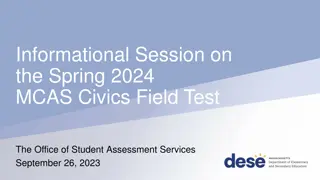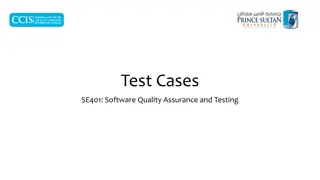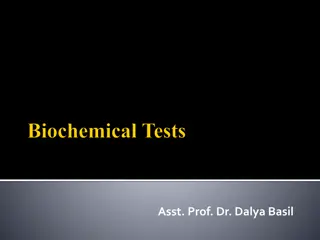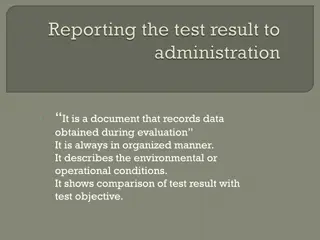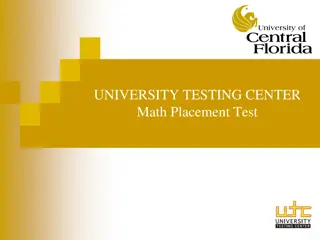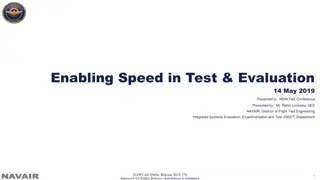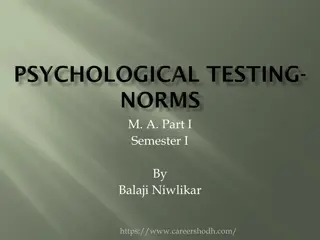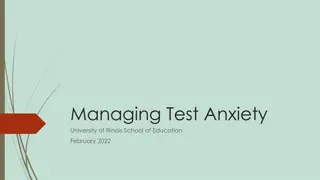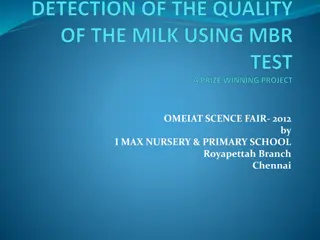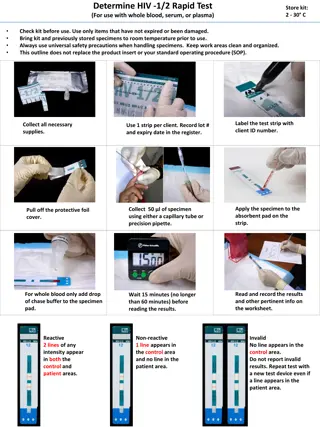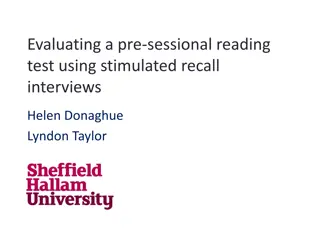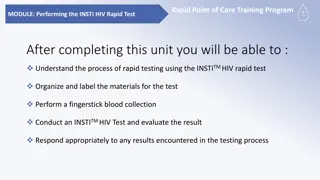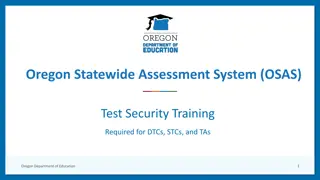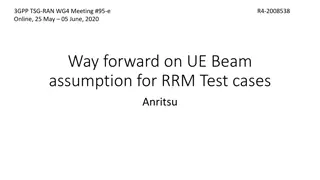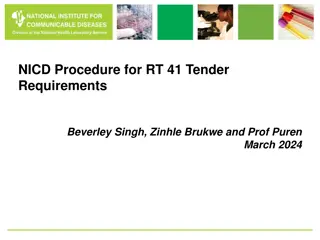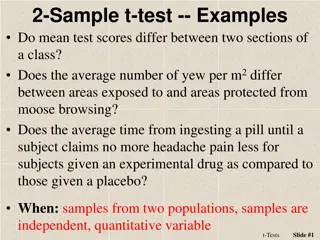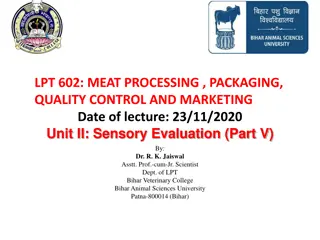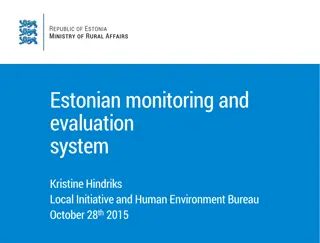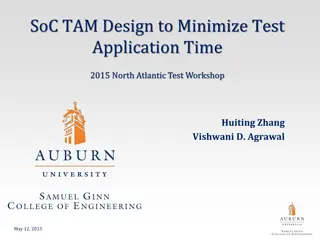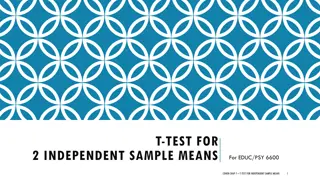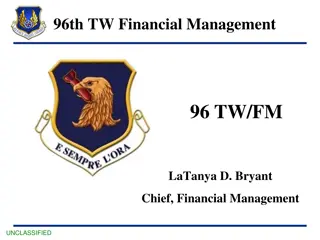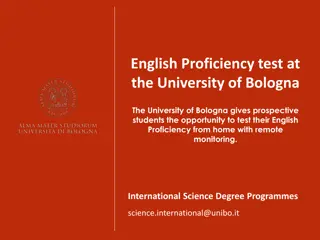Understanding Advertising Media Effectiveness
Advertising effectiveness is crucial for brands to assess the impact of their marketing efforts on target audiences. By measuring strengths, weaknesses, and ROI of advertising campaigns, companies can optimize their strategies for future success. Various approaches such as pre-test, post-test, commu
1 views • 10 slides
Actions Emanating from the Evaluation of the Governance Reform
The evaluation of the governance reform within the WMO aimed to assess its alignment with strategic objectives, effectiveness in responding to societal needs, coordination efficiency, decision-making process, agility, and more. Evaluation criteria included relevance, design validity, effectiveness,
1 views • 13 slides
MCAS Civics Field Test Overview for Spring 2024 Session
This informational session covers the upcoming MCAS Civics Field Test for Spring 2024, including test design, logistics, and agenda. Presenters share insights on the purpose of the field test, assessment content, and evaluation criteria. The session also details the timeline, test administration inf
5 views • 25 slides
Universal Evaluation Framework: Simplifying Evaluation Processes
This session introduces the Universal Evaluation Framework (UEF) developed for evaluating QAA Scotland Enhancement Themes. Participants learn key evaluation questions, evidence capture, and the Theory of Change to enhance evaluation confidence. The QAA Scotland Evaluation Odyssey details historical
2 views • 14 slides
Implementing Blind Evaluation Pilot in HORIZON EUROPE: Key Facts and Process
HORIZON EUROPE is conducting a pilot on Blind Evaluation in the 2023-2024 work program to address biases in the research and innovation evaluation process. The pilot aims to assess the feasibility of blind evaluations in ensuring fairness and mitigating potential biases towards well-known organizati
9 views • 9 slides
Effective Strategies for Overcoming Test Anxiety
Learn practical methods to combat test anxiety in this 1-hour workshop by CCAMPIS Kayla Taylor. Topics covered include avoiding test anxiety, preparing effectively for tests, identifying and reducing sources of anxiety, quelling anxiety, test-taking strategies, and stress management. The PASS method
0 views • 13 slides
Exploring Developmental Evaluation for Better Decision-Making
Delve into the realm of developmental evaluation, focusing on its purpose, principles, and application in practice. Understand how developmental evaluation emphasizes real-time data collection for informed decision-making in complex systems. Learn about key principles such as developmental purpose,
0 views • 25 slides
Understanding Software Testing: Test Cases, Selection, and Execution
Software testing plays a crucial role in identifying and resolving issues within software products. Test cases, selection, and execution are fundamental aspects of the testing process. Test cases define conditions for testing software functionality, with a focus on repeatability and data specificity
2 views • 36 slides
Enhancing Evaluation Capabilities in Mongolia for Agenda 2030
The Mongolian Evaluation Network in collaboration with UNDP is working to integrate the 2030 Agenda into national strategies and plans, establish institutional coordination mechanisms, align budgets, and enhance data monitoring systems. Key stakeholders including government agencies, NGOs, and inter
0 views • 9 slides
Understanding Coagulase Test in Microbiology
The Coagulase test is a crucial microbiological method used to differentiate Staphylococcus aureus (Coagulase Positive) from other Staphylococci (Coagulase Negative). By detecting the presence of the enzyme coagulase, this test helps identify pathogenic strains of Staphylococcus that can cause serio
2 views • 28 slides
Importance of Test Result Reporting in Educational Evaluation
Documenting and reporting test results in an organized manner is crucial for evaluating educational effectiveness. Test results help administrators gather information about students' performance, aptitude, interests, and overall program success. By analyzing test data, educators can predict future s
0 views • 7 slides
University Math Placement Test Overview
The University Math Placement Test is a tool to help place students accurately into math courses, ensuring their success. It consists of three practice tests - Algebra, Trigonometry, and Precalculus. Students start with the Practice Algebra Test and have the opportunity to advance based on their sco
0 views • 13 slides
Understanding Evaluation in Education
Evaluation in education is a comprehensive term that encompasses measurement, testing, and qualitative examination of student behavior. It involves both quantitative and qualitative descriptions, along with value judgments. Differentiating from mere measurement, evaluation provides a deeper analysis
0 views • 28 slides
Revolutionizing Test and Evaluation for Enhanced Naval Aviation Capabilities
Revising test design and methodologies to accelerate delivery of advanced naval aviation capabilities. The ISEET team focuses on swift evaluation, leveraging cutting-edge expertise and technologies to ensure rapid and effective capability delivery for warfighters. Embracing diversity, integrity, and
5 views • 15 slides
Understanding Measures of Central Tendencies and Norms in Test Evaluation
Exploring topics such as measures of central tendencies (mean, median, mode), variability, understanding raw scores, standardization samples, norms in test evaluation, and types of evaluation protocols. Learn about developing norms, derived score interpretation, and the significance of evaluation me
7 views • 35 slides
Sustainable Evaluation Systems Workshop Summary
Workshop on Sustainable Evaluation Systems by Stephen Porter at the NEC Conference focused on defining evaluation systems, addressing their failures, and emphasizing the importance of quality, use, and networks in achieving sustainability. Participants engaged in activities such as bingo card introd
0 views • 38 slides
Understanding the Test of Promotion in Christian Ministry
The Test of Promotion in Christian ministry is designed to assess and examine the attitudes, motives, and true inner beliefs of individuals called by God. It serves to identify those truly called, equip them with spiritual understanding, and test their faith for trustworthiness. Passing through this
1 views • 20 slides
Understanding Evaluation and Ideology in Translation
Evaluation plays a crucial role in the study of translation, influencing both meaning and value in communication. This evaluation is reflected through language elements like accentuation, deletion, and substitution. Appraisal, stance, and evaluation are key terms in linguistic analysis that focus on
2 views • 22 slides
Managing Test Anxiety Tips for Success in Illinois Licensure Exam
Successfully passing the Illinois licensure test requires not only content knowledge but also effective test-taking strategies and managing test anxiety. This guide provides valuable tips on addressing test anxiety before the exam, including putting things in perspective, recalling past successes, u
0 views • 14 slides
Impact and Evaluation Toolkit for Churches and Christian Charities
This toolkit aims to equip churches and Christian charities engaged in small-scale social action projects to think about impact, measure impact, choose data tools, reflect on evaluation data, and use it effectively. It covers principles of evaluation, setting objectives, selecting indicators, storyt
0 views • 34 slides
Overview of Monitoring and Evaluation in the GEF
The Evaluation in the GEF and Training Module focuses on promoting accountability and learning within the Global Environment Facility (GEF) through monitoring and evaluation activities. The GEF Independent Evaluation Office plays a crucial role in assessing results, effectiveness, and performance of
0 views • 25 slides
Methylene Blue Reduction Test for Milk Quality Assessment
The Methylene Blue Reduction (MBR) test is utilized to assess the quality of milk based on the reduction of color imparted by a dye. The disappearance of color indicates the presence of bacteria in milk. This test involves adding methylene blue dye to milk samples, observing the color change, and me
0 views • 20 slides
HIV Rapid Test Procedures and Instructions
This content provides detailed instructions for conducting HIV rapid tests using three different kits: Determine HIV-1/2 Rapid Test, Uni-Gold HIV-1/2 Rapid Test, and Bioline HIV-1/2 Rapid Test. The instructions include steps such as specimen collection, test device preparation, result interpretation
0 views • 5 slides
Evaluation of Pre-sessional Reading Test Using Stimulated Recall Interviews
This evaluation study examines a pre-sessional reading test through stimulated recall interviews to understand how students tackled the test, what reading skills and strategies they employed, and if the test items effectively elicited the intended cognitive processes. Data was collected from two coh
1 views • 32 slides
Developing an Evaluation Work Plan for Effective Program Assessment
This presentation by Amy D. Andrade from San Jose State University focuses on developing an Evaluation Work Plan to identify responsibilities and timelines. It covers topics such as Evaluation Coaching Support, Webinar Outlines, Logic Model, Inputs-Outputs-Outcomes, Two Approaches to Evaluation, Pro
0 views • 29 slides
Rapid Point of Care Training Program - Performing the INSTI HIV Rapid Test
This training module provides a comprehensive guide on conducting rapid HIV testing using the INSTI HIV rapid test. It covers organizing materials, performing blood collection, conducting the test, and interpreting results. The INSTI HIV rapid test is licensed in Canada and approved in Ontario for r
0 views • 12 slides
Oregon Statewide Assessment System (OSAS): Test Security Training Overview
This information outlines the test security training requirements for Designated Test Coordinators (DTCs), School Test Coordinators (STCs), and Test Administrators (TAs) in Oregon's Statewide Assessment System (OSAS). It covers topics like ensuring a secure testing environment, handling printed test
0 views • 20 slides
Evaluation Synthesis in Changing Contexts: Enhancing Knowledge for Development Effectiveness
Evaluation synthesis is crucial for promoting learning, reflection, and decision-making in development work. This process involves bringing together diverse knowledge sources to generate strategic insights and facilitate wider use of evaluation findings. The Independent Office of Evaluation of IFAD
0 views • 20 slides
Update on UE Beam Assumption for RRM Test Cases in 3GPP Meetings
The latest developments in 3GPP meetings regarding UE beam assumption for RRM test cases are outlined. Discussions include the need for UE beam type assumptions, updates to test cases for FR2, and upcoming presentations focusing on specific test cases and beam assumptions per test group. Test purpos
0 views • 9 slides
NICD Procedure for RT-41 Tender Requirements and Evaluation of HIV Rapid Test Kits
The NICD provides detailed tender requirements for professional kits and self-test kits to meet technical specifications. Suppliers must adhere to pre-screen suitability criteria, provide evidence of independent evaluation by recognized agencies, possess necessary certifications, submit regulatory v
0 views • 14 slides
Evaluation of FME Zero Emission Neighbourhoods in Smart Cities
The mid-term evaluation process of FME Zero Emission Neighbourhoods in Smart Cities involves self-evaluation, partner evaluation, and panel evaluation. The procedure includes scientific review, evaluation by scholars, and innovation assessment. Key documents like self-reports, progress reports, and
1 views • 20 slides
Understanding 2-Sample t-Test Examples
The 2-sample t-test is used to determine if mean scores differ between two groups in various scenarios, such as comparing test scores in different sections, yew density in moose browsing areas, or headache pain relief with different treatments. Key steps include formulating hypotheses, calculating t
0 views • 13 slides
Overview of Regular Evaluation 2017 Findings in Estonia
In the Regular Evaluation 2017, efforts were made to maximize the benefits of evaluation outcomes for various stakeholders in Estonia such as the state, society, and institutions. The evaluation focused on a range of actions including preparing legislation, finding experts, creating self-report form
0 views • 6 slides
Comprehensive Guide to Training Evaluation Methods
This detailed guide covers the aim of evaluation, evaluation methods, techniques of evaluation, types of evaluation (formative, process, outcome, impact), and the significance of formative and process evaluation in assessing training effectiveness. Learn about the key principles and practices involv
0 views • 45 slides
Sensory Evaluation Techniques in Meat Processing: A Comprehensive Overview
Explore the various sensory evaluation techniques used in meat processing, including Ranking Test, Rating Test, Flavour Profile Test, and Texture Profile Test. Learn how panelists evaluate food samples based on specific properties like sweetness and preference, providing valuable insights for qualit
0 views • 5 slides
Estonian Monitoring and Evaluation System Overview
Estonian Monitoring and Evaluation System involves elements like Evaluation Plan, Ex-ante and Ex-post evaluation, compulsory indicators, and regulations for data collection. It outlines the responsibilities of Managing Authorities and LAGs in planning and conducting evaluation activities. The system
0 views • 20 slides
Efficient Design Strategies for Minimizing Test Application Time in SoC
This paper discusses innovative design approaches to minimize test application time (TAT) in System-on-Chip (SoC) testing. It addresses challenges in incorporating hardware and power constraints into SoC test scheduling, focusing on test access mechanism (TAM) design and test scheduling strategies.
0 views • 23 slides
Introduction to Independent Sample Means T-Test in Educational and Psychological Research
Independent Sample Means T-Test is a statistical analysis used to compare the means of two independent groups to determine if there is a significant difference between them. This test is commonly used in educational and psychological research to assess the effectiveness of interventions or treatment
0 views • 21 slides
Financial Management Overview at 96th Test Wing
Financial Management at the 96th Test Wing involves budgeting, billing, and support for test projects in areas such as conventional munitions, command and control systems, aircraft avionics, and radar cross-section measurement. The mission includes executing Test & Evaluation (T&E) funding, managing
0 views • 4 slides
English Proficiency Test at University of Bologna: Remote Monitoring Option
University of Bologna offers prospective students the chance to test their English proficiency from home with remote monitoring. The test is available for programs including Science of Climate, Physics, Astrophysics, and more. Applications are made via email with specific test dates and technical re
0 views • 11 slides


